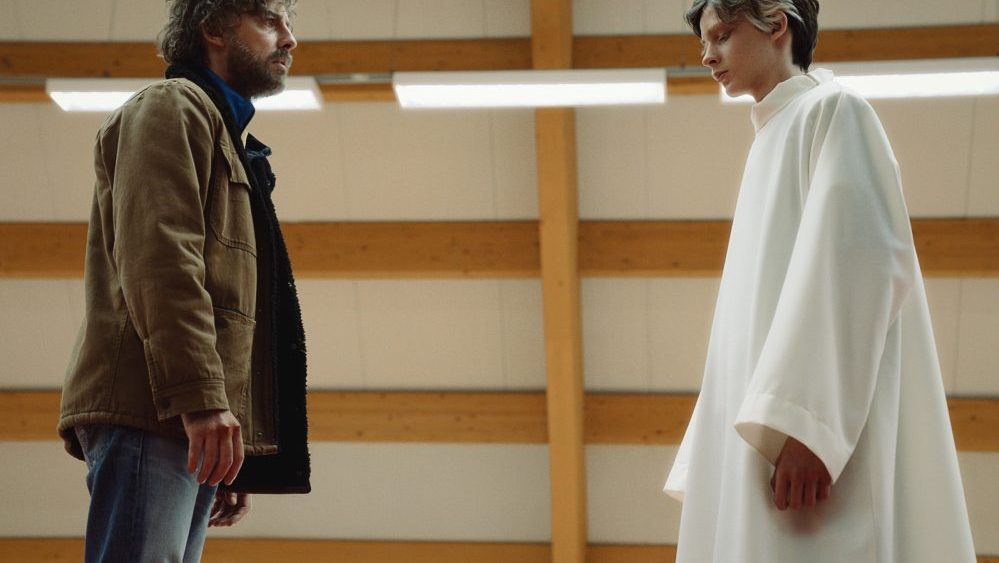There is not much more to the secluded Italian village of Remis, the setting for Paolo Strippoli‘s crackling supernatural horror “The Holy Boy,” than the road that runs through it, a high school, a tavern and the low-roofed dwellings that house an unusually contented community. Remis is such a happy place, in fact, that the town motto is “Valley of Smiles.” But it’s also ordinary, dull even — the screenplay, co-written by Strippoli, Jacopo Del Giudice and Milo Tissone, so intelligently commingles the area’s uncanny energies with plausible reality, that you can’t be sure that, driving on a dark night, you might not make a wrong turn and end up in this fictional place. If that happens, maybe don’t dawdle.
Then again, perhaps you’d have no choice, like ex-champion judo star Sergio Rossetti (a superbly rumpled Michele Riondino) who has been lured by a temp job teaching PE in the local school. It’s hardly a plum assignment, but Sergio is trying to outrun his grief and guilt over a recent loss, and maybe thinks it will not find him here. Certainly his arrival is big news in a small town. The teachers line up to greet him and the students have painted a welcome banner celebrating his peak judo victory. Sergio tears it down and makes the class run laps.
But he is not by nature a dour man, and Riondino plants a little spark of wit deep in the character’s self-loathing. Later, one of his students, Matteo (excellent newcomer Giulio Feltri), will complain “You’re always joking around.” To which Sergio replies, “I used to, and now I am again, thanks to you.” Miraculously, Matteo has taken his pain away. That first night in Remis, blustering and drunk, Sergio’s trauma had been so obvious to Michela (Romana Maggiore Vergano) the sympathetic bartender in the local pub, that she let him in on the town secret. Matteo, a strange, solitary 15-year-old with a stripe of albinism affecting one temple, one eyebrow and half a set of eyelashes, has the ability to remove a tormented soul’s unhappiness, simply by hugging them. At regular ceremonies run by local priest Don Attilo (Robero Citran) and funded via a discreet donation basket, Matteo hugs the townspeople one by one, according to a strict schedule organized by his manager father, Mauro (Paolo Pierobon). He does not erase their memories. He simply makes the memories not hurt.
As a community, Remis has been badly hurt. A decade and a half prior, a train derailment in the region cost dozens of lives, and many locals lost loved ones. We hear about it via the radio reports playing during the film’s terrifically yikes prologue: As news of the mounting casualty count burbles in the background, a mother is trying the old airplane routine to get her baby to eat his food. Suddenly, mid-vrooom, her expression changes to one of dawning fear and she drops to the floor. Was there — a ghastly thought — something in the offscreen baby’s gaze that has stopped her heart dead in her chest? Oh wait, no. It’s much worse than that.
That one-two rhythm whereby one bad-enough thing happens only to immediately be followed by something more dreadful, is repeated throughout, and gives a story that is dark in its themes a vibe of mordant playfulness in its presentation. And nowhere is the double-punch more evident than in the gradual exploration of Matteo’s other, less benign, superpower which, let’s just say, opens up all sorts of questions about consent and violation. Matteo is holy perhaps, but he’s also a friendless 15-year-old freak-show with awakening sexual urges and the ability to explore them in a uniquely destructive but untraceable manner. And how must it feel to be a lonely teenager with a gay crush on an antagonistic classmate, who also happens to be worshipped as a near-messiah? Only Sergio, not just grateful for Matteo’s analgesic embrace, but also using him to fill the son-shaped hole in his own life, cares to ask.
There’s a little bit of “Carrie” and “The Omen” here, a hint of “The Village,” and a nod, in DP Cristiano di Nicola’s crisp yet moody cinematography, to restrained Scandi-horrors like “Let the Right One In” and “The Innocents.” But “The Holy Boy” is its own thing, maintaining its moral ambivalence even as it ramps up to a spectacular finale. Plot and character are knotted elegantly around a surprisingly melancholic core, that reminds us we need pain in our lives, even when our lives are made unlivable by that pain. Matteo, haloed in the promise of an end to all suffering, must seem like an angel, but sometimes the ultimate curse is to get exactly what you think you want. The devil was once an angel too, and perhaps he was 15 when he fell.

